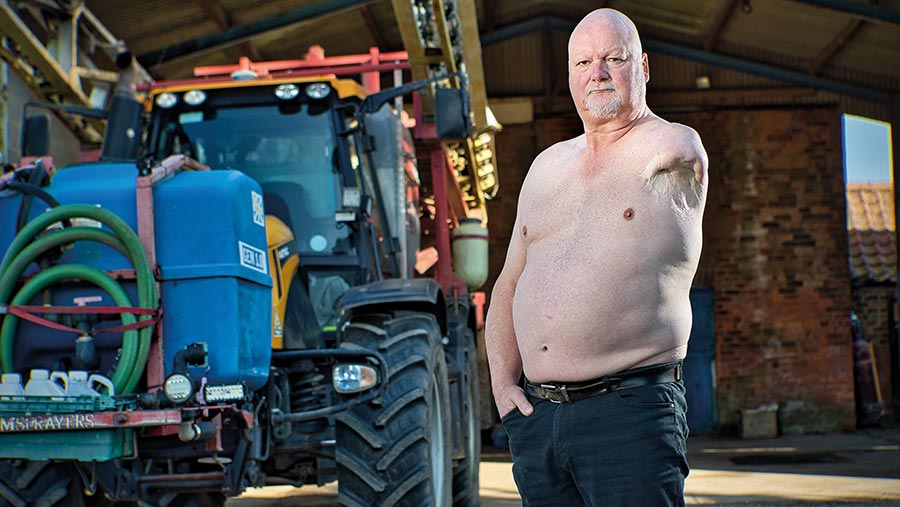Dying to Feed You: James was dragged into a potato harvester
 James Bannister © Richard Stanton
James Bannister © Richard Stanton James Bannister lost his left arm after being dragged into a potato harvester. After the trauma of being stuck inside the machine for over two hours, he was airlifted to hospital and had to sign his own consent form to have his arm amputated.
Watch the video and read the full story below.
It was 6 August 1998 – a Thursday. It was about 10am – somewhere about that time, anyway. A nice, warm, sunny day.
I went to work that morning as normal. We were lifting potatoes. We had finished a field and we’d run the harvester empty to make sure it was clear.
I was standing between the harvester and the trailer, talking to my trailer man.
See also: Tim fell 14ft and lost part of his skull
I have no recollection at all what happened. But I got tangled in the haulm roller. The harvester took my arm and pulled me in – up and over – into the machine.
It stripped all the skin off my arm and started pulling the nerves out of my neck and shoulder.
My arm was stuck and so was I. My mate stopped the tractor. He came rushing over and asked me what he should do.
I said take the power shaft off, get the bar and wind the bloody thing backwards and get me out of here. But I was up to my neck in the roller.
Emergency help
They called for emergency help. I was inside the machine for two hours or more. I was fully conscious for most of it. I knew what was going on 95% of the time.
One of the other tractor drivers came and started talking to me – he stayed with me all the way through as they tried to get me out.
Bless him, he admitted afterwards he couldn’t stand the sight of blood but he stayed with me the whole while.
I found out later that the surgeon came to the field as well – ready to amputate my arm so they could free me. But they managed to get me out of the machine.
When the pressure released, it also released an awful lot of blood. It sounded like someone was pouring water out of a jug.
It’s a strange feeling. You know what you’ve done and you know you want to get out. But it doesn’t quite work like that.
They carried me to the air ambulance. My left arm was in such a state, it wouldn’t hold in place.
I kept holding onto it with my right hand because as soon as I let go, it would flop straight down again. When I looked at it I knew I’d lost it – I knew it couldn’t be saved.
The hospital is about an hour away by road. But the air ambulance got me there in nine minutes.
I think that’s what saved my life more than anything. I actually signed my own consent form for the surgeon to amputate my arm. Looking back, it was a frightening thing to do.
Sunday dinner
I ended up going home 10 days later for Sunday dinner. My four-year-old son was waiting for me.
That was hard because I couldn’t pick him up. I knew life was going to change drastically. But I wanted to prove to people that I could still work.
I lost my job. So I bought a tractor and set up a contracting business.
Slowly but surely over the years, I’ve proved I can still do 95% of the work I did before. Sometimes I struggle, but there are people I can call on.
After working for various people in different places, I met my partner, Lorraine. We set up JLR Farm Services – and now run a spraying and muckspreading business.
Word of mouth is a good advertisement. But it’s been hard.
My message is do your safe-stop. Switch off your machine when it’s not working. Shut it down.
Even if it takes five minutes to restart it and get everything up to speed again. Your life is worth more than that. I miss my arm. It’s never going to be there again.
How to prevent accidents with machinery
Oliver Dale, managing director at Safety Revolution, says: “James’ story is one of incredible mental strength and a testament to the quality of care that he received in the field.”
Mr Dale advises:
- Always use safe stop
- Overcome your desire to “crack on” when under pressure
- If you have personal protective equipment, use it. If you can’t for any reason, stop and re-evaluate
- Discuss safety regularly, particularly during periods of peak work load
- Take 10 minutes every morning to check in and discuss anything relating to safe working for that day’s activities.
Dying to Feed You
 About the campaign
About the campaign
Farming has the highest number of workplace fatalities of all occupations. Farmers Weekly is pledging to use its voice, influence and reach to reduce the accident rate in agriculture.
See the other farmers’ stories and find out how you can be a part of helping us change agriculture’s safety record at fwi.co.uk/dying-to-feed-you
Partner message
The team at Safety Revolution are delighted to be working with Farmers Weekly to reduce deaths in agriculture and to show how we can work together to create safer farms.
Building strong and positive safety cultures delivers happy and safe teams, fewer incidents and improved productivity. We look forward to exploring individual case studies and shining a light

